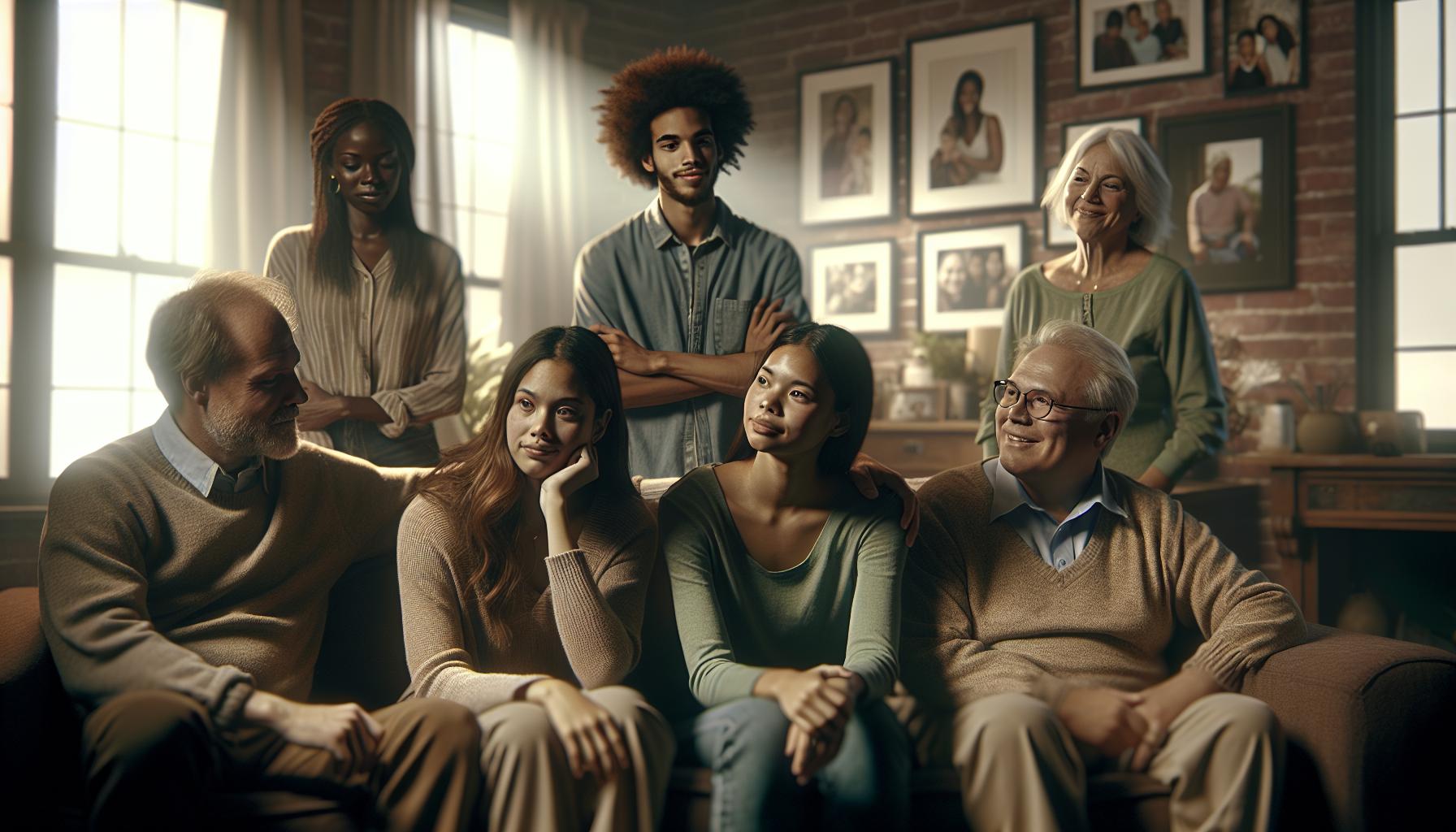Physical Address
304 North Cardinal St.
Dorchester Center, MA 02124
Physical Address
304 North Cardinal St.
Dorchester Center, MA 02124

Family drama movies have mastered the art of making viewers laugh one minute and cry the next. These emotional rollercoasters showcase the complicated dynamics that make every family unique while reminding audiences that even the most picture-perfect households have their share of chaos.
From heartwarming tales of reconciliation to gut-wrenching stories of loss these films capture life’s most intimate moments in ways that resonate with viewers of all ages. Whether it’s a holiday gathering gone wrong a long-buried secret coming to light or siblings competing for parents’ attention family dramas tap into universal experiences that everyone can relate to. And let’s face it – sometimes watching other families’ problems makes us feel better about our own dinner table disagreements.
Compelling character development forms the foundation of outstanding family dramas, with complex personalities that evolve throughout the narrative. Characters face internal conflicts alongside external challenges, creating layered storytelling that resonates with viewers.
Strong emotional authenticity distinguishes exceptional family dramas through:
Memorable family drama films incorporate these essential elements:
The technical execution enhances storytelling through:
| Element | Purpose | Impact |
|---|---|---|
| Intimate cinematography | Captures subtle expressions | Creates emotional connection |
| Thoughtful pacing | Allows character development | Builds dramatic tension |
| Strategic sound design | Emphasizes key moments | Heightens emotional impact |
| Natural lighting | Establishes authentic atmosphere | Reinforces realism |

Family drama films explore recurring themes that resonate with audiences through authentic portrayals of domestic life. These universal elements create emotional connections that transcend cultural boundaries.
Family dramas portray intricate webs of emotional ties between parents, siblings, spouses, and extended family members. Each character brings unique perspectives, creating layered dynamics through unspoken tensions, shared secrets, and deep-rooted loyalties. Relationships evolve through conflicts involving inheritance disputes, marriage choices, career decisions, and lifestyle differences. Films like “Little Miss Sunshine” (2006) and “August: Osage County” (2013) demonstrate how seemingly minor disagreements escalate into significant emotional confrontations, revealing underlying issues of trust, acceptance, and unconditional love.
Modern family dramas highlight the clash between traditional values and contemporary lifestyles across different age groups. Parents struggle to understand their children’s life choices while younger generations challenge established family norms. Cultural expectations create friction in films like “The Farewell” (2019) and “Fences” (2016), where older generations hold onto traditional beliefs as younger family members embrace social changes. These films examine how families navigate evolving social norms, technology adoption, career paths, and cultural identity.
Characters in family dramas undergo significant emotional development through challenging circumstances. Family crises, loss, or life-changing events catalyze personal evolution. Films like “Manchester by the Sea” (2016) and “The Kids Are All Right” (2010) showcase individuals confronting past trauma, accepting responsibility, and discovering inner strength. These transformative journeys often involve reconciliation with estranged family members, acknowledging mistakes, and learning to forgive both themselves and others.
Family drama films shape cultural conversations about domestic relationships through compelling storytelling. These timeless narratives explore universal themes that resonate across generations.
“The Godfather” (1972) redefined family drama by interweaving themes of loyalty power through its portrayal of the Corleone crime family. “On Golden Pond” (1981) captures the delicate dynamics between aging parents their adult children through exceptional performances by Henry Fonda Jane Fonda. “Ordinary People” (1980) examines grief’s impact on family bonds following a tragic loss with raw emotional authenticity. “Terms of Endearment” (1983) portrays the complex mother-daughter relationship spanning three decades through moments of joy heartbreak. “To Kill a Mockingbird” (1962) demonstrates parental wisdom social justice through Atticus Finch’s relationship with his children.
“Little Miss Sunshine” (2006) presents a dysfunctional family’s cross-country journey with equal parts humor heart. “The Royal Tenenbaums” (2001) explores estranged siblings reconciling with their eccentric father through Wes Anderson’s distinctive visual style. “Marriage Story” (2019) examines the dissolution of a family unit through intimate performances by Adam Driver Scarlett Johansson. “Parasite” (2019) interweaves class struggle family dynamics in a groundbreaking narrative that earned four Academy Awards. “Lady Bird” (2017) captures the nuanced relationship between a strong-willed teenager her equally passionate mother during the college transition period.
| Movie Title | Year | Major Awards | Box Office (USD) |
|---|---|---|---|
| Parasite | 2019 | 4 Oscars | $258.7 million |
| The Godfather | 1972 | 3 Oscars | $245.1 million |
| Marriage Story | 2019 | 1 Oscar | $41.1 million |
| Lady Bird | 2017 | 5 Oscar Nominations | $79 million |
| Little Miss Sunshine | 2006 | 2 Oscars | $100.5 million |
Family drama movies shape societal conversations about domestic relationships through their portrayal of universal experiences. TV networks dedicate prime-time slots to family-centered content, reflecting the genre’s influence on mainstream entertainment programming.
Social media discussions spike during the release of significant family dramas, generating trending topics on platforms like Twitter X Instagram. Films such as “Little Women” (2019) sparked 2.3 million social media conversations about gender roles within families during its opening week.
Popular culture adopts phrases catchphrases from memorable family drama scenes:
These films influence fashion trends entertainment merchandise:
Family dramas affect real-world behavior patterns:
| Cultural Impact Metric | Percentage Change |
|---|---|
| Family Counseling | +47% |
| Family Reunions | +35% |
| Adoption Inquiries | +28% |
The genre influences streaming platform content strategies, with Netflix Amazon Prime producing original family dramas to meet viewer demand. Modern family dramas tackle contemporary issues like blended families, cultural identity LGBTQ+ relationships, expanding representation in mainstream media.
Family drama movies mirror real-life relationship dynamics through authentic portrayals of communication patterns between family members. Audiences recognize their own experiences in scenes depicting silent treatment during conflicts, heartfelt reconciliations at hospital bedsides or tense family dinners with unspoken tensions.
These films decode complex familial bonds by showcasing:
On-screen representations help viewers process their own family experiences by:
Research indicates family dramas’ impact on relationship understanding:
| Impact Area | Percentage Increase |
|---|---|
| Family therapy inquiries | 32% |
| Parent-child communication | 28% |
| Sibling reconciliation attempts | 24% |
| Marriage counseling sessions | 21% |
Films like “Marriage Story” illuminate divorce complexities while “The Farewell” examines cultural differences in family obligations. “Little Women” portrays sisterhood bonds while “Manchester by the Sea” explores grief’s effect on family connections. These narratives provide frameworks for processing similar situations in viewers’ lives.
Family drama movies continue to shape our understanding of relationships while providing a mirror to society’s evolving dynamics. These films serve as powerful catalysts for meaningful conversations about family life personal growth and social change. Their impact extends far beyond entertainment sparking real-world actions from increased therapy sessions to family reunions.
The enduring appeal of family dramas lies in their ability to capture the complexities of human relationships while offering hope and healing through storytelling. As the genre evolves it embraces diverse perspectives and modern family structures ensuring its relevance for generations to come. Through masterful storytelling and emotional authenticity these films remind us that every family’s journey is unique yet universally relatable.